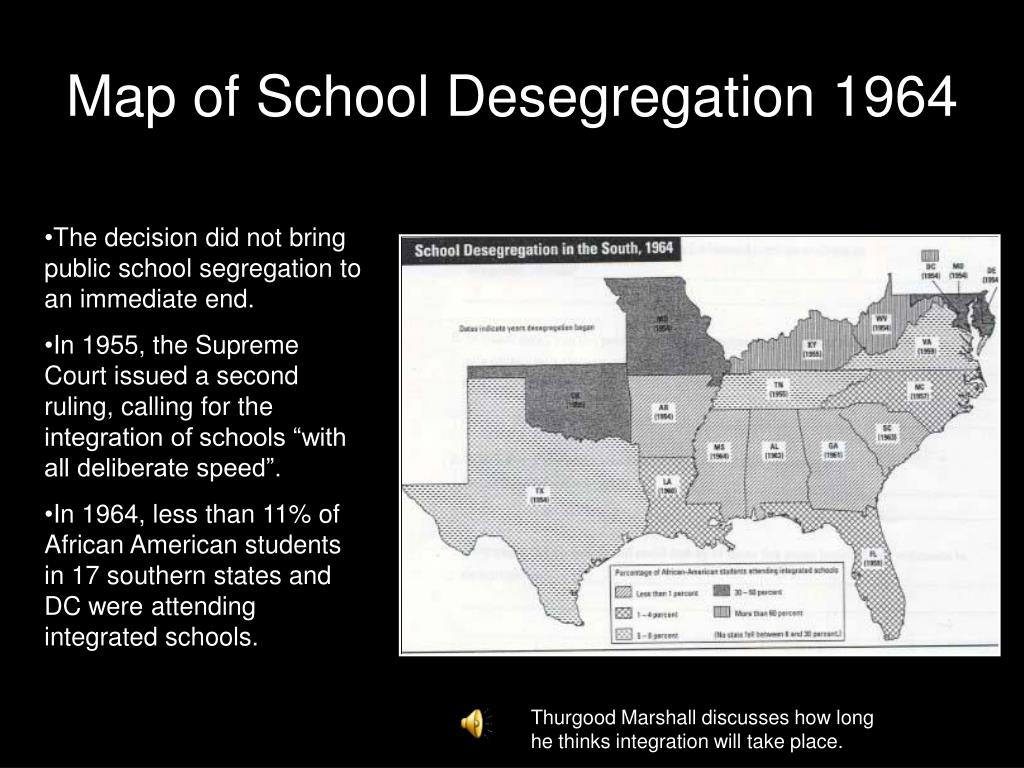The Fallout From The Justice Department's School Desegregation Decision

Table of Contents
The Legal Battles and Landmark Cases
The fight for school desegregation was a long and arduous journey, marked by several pivotal Supreme Court cases. Brown v. Board of Education (1954) stands as a cornerstone, declaring state laws establishing separate public schools for black and white students to be unconstitutional. This landmark decision overturned the "separate but equal" doctrine established in Plessy v. Ferguson (1896) and paved the way for desegregation efforts nationwide.
- Key Legal Challenges and Outcomes:
- Brown v. Board of Education II (1955) mandated the desegregation process with "all deliberate speed," a phrase that proved highly controversial and allowed for significant delays.
- Numerous subsequent lawsuits challenged resistance to desegregation, often leading to federal court orders and interventions.
- The Civil Rights Act of 1964 further strengthened the legal basis for desegregation, prohibiting discrimination in public accommodations, including schools.
The Justice Department played a crucial role in enforcing these rulings, filing lawsuits against recalcitrant school districts and state governments. However, the DOJ faced considerable resistance, highlighting the deeply entrenched nature of segregation and the fierce opposition it encountered. The legal precedent set by these cases, while groundbreaking, proved insufficient to overcome the deeply ingrained societal biases and systemic inequalities.
Resistance and Backlash
The response to court-ordered desegregation was far from uniform. "Massive resistance," a concerted effort by Southern states to defy federal mandates, took various forms:
- White Flight: Many white families moved to the suburbs or enrolled their children in private schools to avoid integration.
- Segregation Academies: Private schools specifically created to maintain racial segregation emerged, circumventing desegregation efforts.
- Legislative Maneuvers: States employed various legal tactics to delay or obstruct desegregation, including gerrymandering and the creation of discriminatory school attendance zones.
This resistance had profound social and economic consequences. White flight depleted resources from urban school districts, exacerbating existing inequalities and creating a self-perpetuating cycle of segregation. Local and state governments often actively worked against desegregation, prioritizing the maintenance of racial hierarchies over equitable educational opportunities.
The Long-Term Educational and Social Consequences
The legacy of school segregation continues to cast a long shadow on American society. The achievement gap between white students and students of color remains a stark reality, a direct consequence of decades of unequal access to resources and educational opportunities.
- Educational Outcomes: Studies consistently show significant disparities in test scores, graduation rates, and college enrollment between racial groups, reflecting the lasting impact of segregated schooling.
- Resource Disparities: Historically, schools in predominantly Black neighborhoods received significantly less funding, leading to inferior facilities, fewer qualified teachers, and limited access to advanced courses.
These educational disparities directly translate into reduced social and economic mobility. Students from disadvantaged backgrounds face significant challenges in overcoming the systemic disadvantages created by historical segregation, perpetuating cycles of poverty and inequality. The ongoing debate surrounding reparations and restorative justice reflects the deep and lasting harm caused by school segregation.
The Justice Department's Ongoing Role
While the most intense period of desegregation battles may be behind us, the Justice Department continues to play a role in addressing school segregation issues. Current initiatives and legal actions focus on:
- School Funding Lawsuits: The DOJ remains involved in litigation challenging discriminatory school funding practices that perpetuate inequities.
- Affirmative Action: The ongoing debate surrounding affirmative action in higher education directly relates to the need to address the lingering effects of school segregation.
The DOJ faces significant challenges in achieving equitable education, including the complexities of modern-day segregation, which often manifests in subtle forms of discrimination and resource allocation. Community involvement remains crucial in promoting school desegregation and ensuring that all students have access to quality education, regardless of race or socioeconomic status.
Conclusion
The fallout from the Justice Department's school desegregation decisions has been complex and far-reaching. While landmark legal victories established the principle of equal educational opportunity, the resistance encountered, and the long-term consequences for students of color, have revealed the enduring nature of systemic racism. The achievement gap, disparities in resource allocation, and reduced social mobility all underscore the need for sustained and comprehensive efforts to achieve educational equity. Understanding the fallout from the Justice Department's school desegregation decision is crucial to building a more equitable future. Learn more and get involved in promoting school desegregation today, supporting organizations dedicated to achieving educational justice and dismantling the remnants of segregation in our schools.

Featured Posts
-
 Will Sec Decisions Shape Xrps Big Moment Analyzing Etf Prospects And Ripples Impact
May 02, 2025
Will Sec Decisions Shape Xrps Big Moment Analyzing Etf Prospects And Ripples Impact
May 02, 2025 -
 Wyroznienia Solidarnosc Znaczenie I Kontekst Historyczny
May 02, 2025
Wyroznienia Solidarnosc Znaczenie I Kontekst Historyczny
May 02, 2025 -
 Los Angeles Palisades Fires Impact On Celebrity Homes Full List
May 02, 2025
Los Angeles Palisades Fires Impact On Celebrity Homes Full List
May 02, 2025 -
 Steekincident Groningen Meer Informatie Over De Aanhouding Van Malek F
May 02, 2025
Steekincident Groningen Meer Informatie Over De Aanhouding Van Malek F
May 02, 2025 -
 Actor Michael Sheen Pays Off 1 Million In Debt For 900 Individuals
May 02, 2025
Actor Michael Sheen Pays Off 1 Million In Debt For 900 Individuals
May 02, 2025
Latest Posts
-
 Solve Nyt Strands Game 354 Thursday February 20 Hints And Answers
May 10, 2025
Solve Nyt Strands Game 354 Thursday February 20 Hints And Answers
May 10, 2025 -
 Jeanine Pirro From Fox News To Potential Dc Prosecutor Under Trump
May 10, 2025
Jeanine Pirro From Fox News To Potential Dc Prosecutor Under Trump
May 10, 2025 -
 Fox News Hosts Sharp Rebuttal To Colleagues Trump Tariff Comments
May 10, 2025
Fox News Hosts Sharp Rebuttal To Colleagues Trump Tariff Comments
May 10, 2025 -
 Fox News Jeanine Pirro Trumps New D C Prosecutor
May 10, 2025
Fox News Jeanine Pirro Trumps New D C Prosecutor
May 10, 2025 -
 Jeanine Pirro Exploring Her Background Achievements And Net Worth
May 10, 2025
Jeanine Pirro Exploring Her Background Achievements And Net Worth
May 10, 2025
